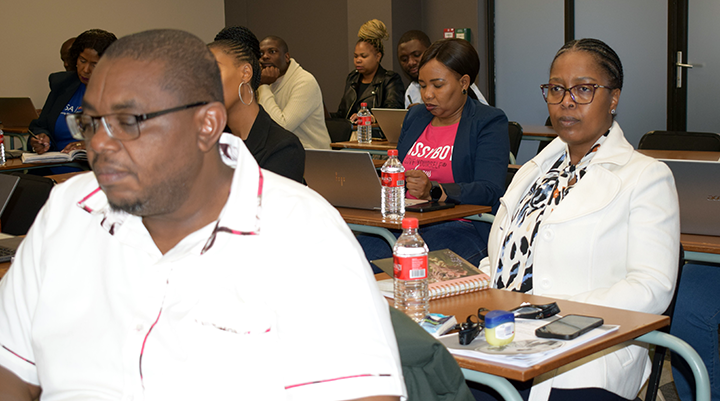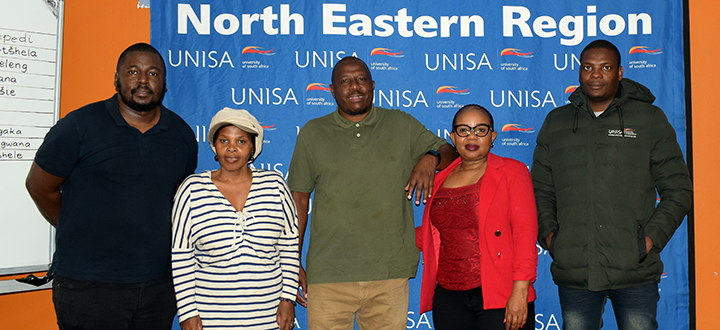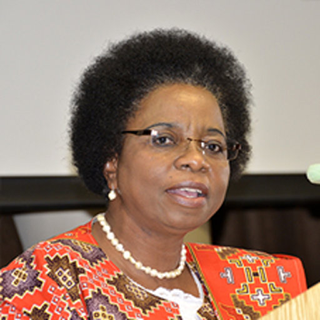News & Events
Major boost for Unisa’s regional academic support services
In 2023, Unisa’s commitment to enhancing student support services was solidified through visits by the Department of Teaching, Learning, Support and Facilitation of Learning (DTSFL) to various regional centres. This initiative was aimed at evaluating areas for collaboration to improve student throughput rates. The Academic Quality Assurance and Enhancement (AQAE) unit subsequently invited regional centres to present their existing services, prompting a discussion on the uniformity and accessibility of these services across the regions.

Regional staff attending a consultation visit
Formation of a task team
An inaugural meeting was convened to discuss the existing services and their delivery, with a focus on gaining an understanding of the quality assurance processes related to tuition and support in the regions. This meeting was attended by representatives of the regions, student leaders (both nationally and in the regions), and representatives of AQAE.
In view of the disparity in service offerings, a project was initiated25 and a task team established to ensure and improve the quality of academic programmes and support services offered to students at regional level. This project aligns with the Unisa 2030 Strategic Plan, pillar 4: Strengthening student support. The team comprises 48 members, including AQAE personnel, regional directors, representatives of national and regional student representative councils, representatives of colleges, and representatives of various support services, such as tutorial services, library services, computer lab services and student counselling services.

AQAE team members
The Executive Director of DTSFL, Professor Meahabo Magano, is the project owner, and Professor Humphrey Mogashoa, the Deputy Registrar: Student Affairs and Regional Services, is the project partner. The two professors are honorary members of the task team.

Project owner Prof Meahabo Magano
The terms of reference for the task team designate the Director of AQAE, Professor Itumeleng Setlhodi, as the chairperson, with the Regional Director, Motale Nkoang, serving as the deputy chairperson. Rose Kedibone Mashishi from AQAE is the project manager. This structure ensures strong leadership and representation from the AQAE unit, colleges and regional centres.
Methodology
To facilitate the quality assurance process, the task team developed guidelines for data collection instruments. Two primary methods were identified: surveys and focus group interviews. Existing reports will also be analysed. This triangulated approach will enable the team to gather comprehensive data on the effectiveness and availability of the identified services.
Identified services for quality assurance
The following six services will be probed:
- Tutorial services
- Library services
- Computer lab services
- Student counselling services
- Teaching and learning services
- Services offered by the Advocacy and Resource Centre for Students with Disabilities (ARCSWiD)
Four subcommittees were formed, and each subcommittee elected a facilitator to report on the progress of instrument development, thereby ensuring accountability, the informed improvement of tutoring and support services, and structured reporting.
Regional visits and contextual understanding
In addition to developing instruments, the task team plans to carry out regional visits to gain a clearer understanding of the local contexts and challenges faced by each region. These visits will provide valuable insights into the effectiveness of the current services that are offered and highlight areas that need improvement.
Conclusion
The collaborative efforts of the AQAE unit, colleges and regional centres signify a commitment to enhancing academic student and tuition support services. By adhering to the Council on Higher Education’s recommendation to avoid duplication of work, the task team aims to implement findings and recommendations that ensure equitable access to services for all students. The active participation of skilled individuals in this initiative is commendable and sets a positive precedence for future quality assurance and enhancement endeavours within the institution.
Through these concerted efforts, Unisa is poised to improve its service delivery in keeping with its motto, “Pro Gentibus Sapientia”, ultimately fostering a more supportive academic environment that is conducive to student success.
* By Khongelani Chauke, Quality Assurance Champion, Department of Tuition Support and Facilitation of Learning
Publish date: 2024/09/19
